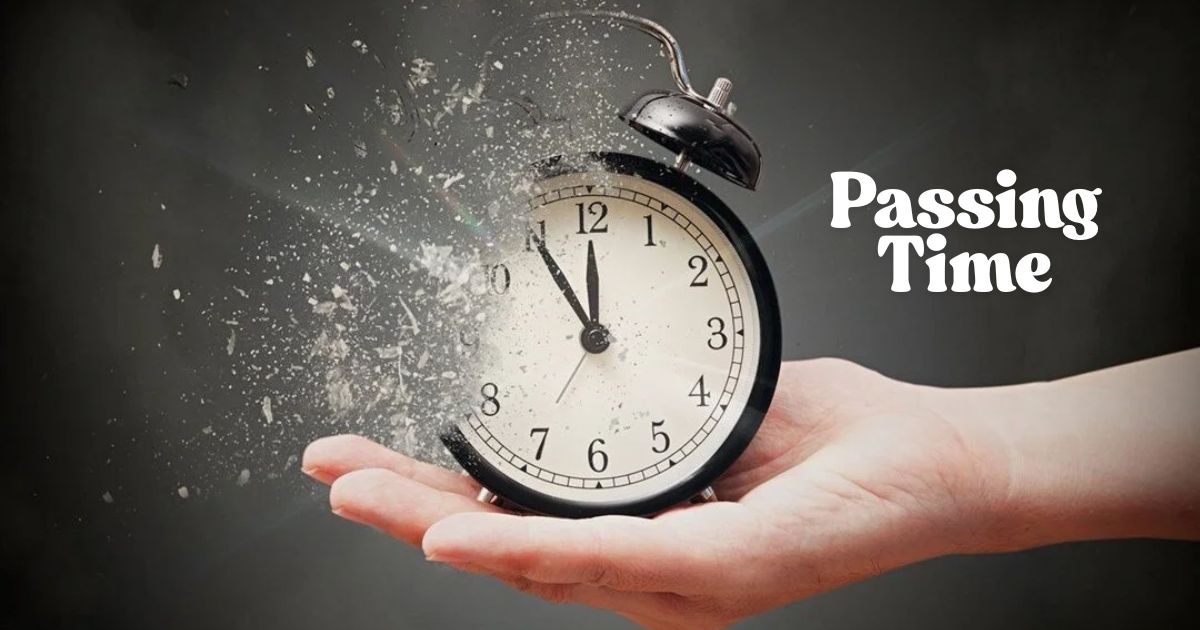Everyone spends time passing time, but have you ever thought about what that really means? Whether you’re stuck waiting in line or simply unwinding at home, those little moments of passing time add up in surprising ways. Sometimes, passing time is about having fun or getting things done. Other times, it’s about simply letting the minutes slip away in quiet calm. How you choose to spend these moments can shape your mood and day.
We don’t just say passing time , people use many colorful phrases like “killing time” or “whiling away the hours.” Each expression captures a unique way we fill those in-between moments. Knowing these alternatives makes your language richer and your stories more vivid. After all, those moments of passing time are a big part of life , and they deserve attention.
Other Ways to Say “Passing Time”
Passing time doesn’t always mean wasting it, it can involve relaxing moments, strategic patience, or meaningful activity. Whether you’re lounging in a park, reading a novel, or simply reflecting, these expressions help describe how people engage with time. Explore nuanced ways to convey the act of passing time effortlessly.
1. Whiling Away the Hours
Example: “She found herself whiling away the hours in the garden, lost in thought.”
Meaning: This phrase suggests spending time in a peaceful and unhurried manner, often filled with reflection or simply enjoying the passing moments. It conveys a sense of relaxation rather than urgency, often associated with leisurely activities.
Usage: Perfect for casual settings when someone is immersed in a quiet moment, such as lounging in a park, reading a novel, or savoring coffee. It has a positive connotation and emphasizes meaningful activity or patient waiting.
2. Killing Time
Example: “He was just killing time at the airport by browsing the shops.”
Meaning: This phrase implies doing something trivial or unproductive while waiting for something else to happen. It can carry a slightly negative connotation, often associated with boredom or inactivity.
Usage: Best used when someone is filling free time in a way that lacks purpose, such as scrolling social media or browsing airport shops. While it may hint at wasting time, it can also reflect strategic patience depending on the context.
3. Biding One’s Time
Example: “She was biding her time until the right career move came along.”
Meaning: This expression suggests waiting for opportunity in a strategic context, often with deliberate choice and patience. It has a calm, composed tone.
Usage: Ideal for scenarios involving anticipation or a calculated approach, such as planning a surprise or waiting for the right moment to act. It reflects thoughtful time management and not necessarily inactivity.
4. Frittering Away Time
Example: “He spent the afternoon frittering away time on trivial tasks.”
Meaning: This phrase points to wasting time on trivial activities that lack significance. It has a clearly negative connotation, implying mismanagement of time.
Usage: Suitable when emphasizing unproductive activities like procrastination or focusing on distractions instead of completing tasks. It highlights lost productivity and possible regret.
5. Idling Away Time
Example: “They idled away the summer days by the lake, enjoying the breeze.”
Meaning: This expression evokes a relaxed, laid-back manner of spending leisure time. It leans toward a neutral tone, depending on context.
Usage: Use this when describing relaxing moments or time spent without urgency, like family time or lounging during vacation. It suggests a choice to pass time without stress.
6. Spending Time
Example: “He enjoys spending time with his family every weekend.”
Meaning: This is a general, neutral tone expression for using one’s time on something, usually with a positive or meaningful intent.
Usage: Commonly used in all contexts, from leisurely activities to productive ones. It works well for discussing family time, career moves, or even exploring new hobbies. It’s a versatile, emotionally positive phrase.
Read More: 12 Other Ways to Say “Clear Communication”
7. Occupying Oneself
Example: “She occupied herself with puzzles while waiting for the doctor.”
Meaning: This phrase suggests staying mentally or physically engaged during moments of inactivity or delay. It reflects a constructive use of time.
Usage: Best for anticipatory contexts, where someone is avoiding boredom by choosing a meaningful activity. Can include playing cards, doing crafts, or reading a novel.
8. Dallying
Example: “Stop dallying and get to work!”
Meaning: Often used critically, dallying refers to wasting time or moving in an aimless manner when action is expected. It implies inefficiency.
Usage: Most appropriate in contexts of procrastination or when highlighting a mismanagement of time. This word has a strong negative connotation.
9. Loafing
Example: “He spent the whole afternoon loafing around the house.”
Meaning: Loafing describes inactivity or laziness, often in a casual setting. It suggests doing nothing of particular value.
Usage: Best used when emphasizing wasting time or lounging in a way that lacks purpose. Common in informal conversations to describe someone being unproductive.
10. Lingering
Example: “They lingered at the café, savoring their last moments together.”
Meaning: Lingering implies staying longer than necessary, usually to savor a quiet moment or because of emotional attachment. It often carries a reflective context.
Usage: Perfect for casual settings like savoring coffee or meandering through a city. It can have a positive, neutral, or even bittersweet tone.
11. Killing Time (Repeated for emphasis)
Example: “She was killing time before her flight by playing cards.”
Meaning: Reiterating the idea of spending time without productivity, often while waiting or avoiding boredom.
Usage: Contexts include scrolling social media, browsing shops, or other leisurely activities that fill time without specific purpose.
12. Marking Time
Example: “He was just marking time in his current job until something better came along.”
Meaning: Marking time refers to continuing routine actions while waiting for opportunity or change. It suggests deliberate patience mixed with anticipation.
Usage: Ideal in strategic contexts or situations involving career moves. It conveys a sense of stagnation paired with intentional delay.
When to Use Different “Passing Time” Alternatives
Different phrases for passing time suit different moods and settings. Use “whiling away the hours” in casual, reflective moments, while “biding one’s time” fits strategic patience. When describing unproductive or idle behavior, “loafing” or “dallying” may work best. Context determines how passing time is framed, positively or negatively.
Casual Settings
In casual settings, passing time often involves relaxed, leisurely activities like lounging in a park, browsing airport shops, or savoring coffee. These moments aren’t about productivity, they’re about enjoyment and reflection. Expressions like “idling away time” or “killing time” naturally capture the laid-back manner of these passing time experiences.
Situations of Waiting
In moments of delay or anticipation, passing time often involves activities that help ease boredom or anxiety. Whether you’re waiting for a flight or a career move, phrases like “biding one’s time” or “marking time” reflect a patient waiting, sometimes strategic, sometimes simply a way to stay occupied.
Strategic or Anticipatory Contexts
In strategic or anticipatory contexts, passing time takes on a purposeful tone. It’s about biding one’s time patiently, preparing for the right moment to act. This calculated approach turns waiting into an opportunity, emphasizing deliberate choice rather than wasting time or inactivity.
Reflecting on Time Management
Reflecting on time management helps you see how passing time affects productivity and relaxation. Taking quiet moments to assess your time usage can prevent frittering away time on trivial activities. Thoughtful reflection encourages better choices, turning free time into meaningful activity rather than unproductive idling.
Versatile and Neutral Use
Some expressions for passing time work well in both casual and strategic situations. Phrases like “occupying oneself” or “marking time” carry a neutral tone, fitting many contexts without implying positive or negative feelings. This versatility makes them useful when you want to describe time usage clearly and without judgment.
Conclusion
Passing time is something we all do every day. Sometimes, it feels like we are just waiting. Other times, we are enjoying or relaxing. No matter what, passing time shapes how we feel. Using different words for passing time helps you explain these moments better. Words like “killing time” or “whiling away the hours” show different ways people spend their free moments.
Remember, passing time is not always wasted. It can be useful or fun. It can also be calm and quiet. Knowing the right phrase to describe passing time makes your writing clear and interesting. Next time you talk about passing time, try using different expressions. It will make your words stronger and more natural. After all, how we spend our moments of passing time matters a lot.

Grammerroot is your trusted source for mastering English grammar and language skills. From simple rules to advanced tips, we help learners build strong foundations through easy-to-understand content. Learn smart, learn right — only at Grammer Root.




